The Deeper Thinking Podcast
The Deeper Thinking Podcast The Deeper Thinking Podcast offers a space where philosophy becomes a way of engaging more fully and deliberately with the world. Each episode explores enduring and emerging ideas that deepen how we live, think, and act. We follow the spirit of those who see the pursuit of wisdom as a lifelong project of becoming more human, more awake, and more responsible. We ask how attention, meaning, and agency might be reclaimed in an age that often scatters them. Drawing on insights stretching across centuries, we explore how time, purpose, and thoughtfulness can quietly transform daily existence. The Deeper Thinking Podcast examines psychology, technology, and philosophy as unseen forces shaping how we think, feel, and choose, often beyond our awareness. It creates a space where big questions are lived with—where ideas are not commodities, but companions on the path. Each episode invites you into a slower, deeper way of being. Join us as we move beyond the noise, beyond the surface, and into the depth, into the quiet, and into the possibilities awakened by deeper thinking.
Episodes
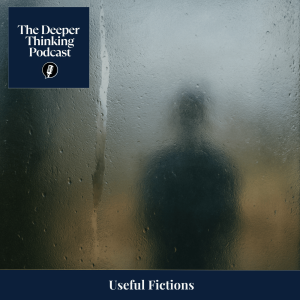
Sunday May 18, 2025
Sunday May 18, 2025
Useful Fictions: Evolution, Perception, What We Render, and the Ethics of Seeing Less
The Deeper Thinking Podcast
For those drawn to perceptual humility, philosophical depth, and the subtle ethics of not-knowing.
What if evolution didn’t favor truth? What if it favored usefulness—and what we see is more like a desktop interface than a window onto the real? This episode explores how evolutionary pressures shaped perception not to reveal reality, but to keep us alive. Drawing on cognitive science, philosophy of mind, and evolutionary theory, we examine the quiet proposition that the world as we see it may be a helpful fiction.
This is not an argument for despair, but for care. With nods to thinkers like Donald Hoffman, Immanuel Kant, and Maurice Merleau-Ponty, we explore how perception becomes relational, how attention becomes ethical, and how uncertainty can deepen—rather than diminish—meaning.
To see less isn’t to fail. It may be the condition for intimacy, for listening, and for the kind of care that begins where certainty ends.
Reflections
This episode asks what kind of seeing leads to reverence. What if meaning doesn’t come from clarity, but from the way we hold what cannot be resolved?
Certainty closes. Humility opens.
The world doesn’t need to be seen completely to be honored completely.
We don’t need clearer eyes—we need gentler ones.
Seeing differently can be an act of responsibility.
Not all illusions are errors. Some are gifts from nature to keep us alive.
The shimmer at the edge of perception is not a flaw—it’s an invitation.
Knowledge may begin in rupture—but it matures in relation.
Why Listen?
Explore how evolution shaped perception as an adaptive interface
Reflect on why seeing less might deepen—not distort—meaning
Learn how attention, not certainty, underpins ethical vision
Engage with Hoffman, Kant, and Merleau-Ponty on truth, perception, and relation
Listen On:
YouTube
Spotify
Apple Podcasts
Support This Work
If this episode resonated and you’d like to support deeper thinking in the world, you can do so here: Buy Me a Coffee. Thank you for being part of this unfolding conversation.
Bibliography
Hoffman, Donald D. The Case Against Reality. W. W. Norton, 2019.
Kant, Immanuel. Critique of Pure Reason. Trans. Paul Guyer & Allen Wood. Cambridge: CUP, 1998.
Merleau-Ponty, Maurice. Phenomenology of Perception. Trans. Donald Landes. Routledge, 2012.
Bibliography Relevance
Donald Hoffman: Provides the foundational theory of perception-as-interface.
Immanuel Kant: Frames perception as structured by mind, not by the world itself.
Maurice Merleau-Ponty: Grounds the relational, embodied aspects of seeing.
The clearest eyes may miss the deepest truths. But those who look gently may see what matters most.
#EvolutionaryPerception #DonaldHoffman #Phenomenology #Kant #MerleauPonty #PhilosophyOfVision #Attention #Epistemology #TheDeeperThinkingPodcast #UsefulFictions #SeeingAndKnowing #InterfaceTheory

Saturday May 17, 2025
Saturday May 17, 2025
The Art of Not Boarding Every Bus: Thoughts, Distance, and the Practice of Letting Go
The Deeper Thinking Podcast
For anyone quietly learning to let thoughts pass without following every one.
This episode is a parable about thoughts, and the practice of cognitive diffusion. Through the metaphor of buses and benches, we explore what it means to notice a thought, to pause before reacting, and to choose not to follow. What begins as habit slowly becomes practice. What once felt automatic becomes something else entirely: space.
It’s a story that models freedom within thought, shaped by the spirit of thinkers like Steven C. Hayes (cognitive defusion), Iain McGilchrist (attentional depth), and Simone Weil (attention as a moral act). The story offers no solution—only a rhythm. A way of sitting beside a thought. A way of letting it pass.
Here, diffusion is not described—it is lived. In the gentle tension between reflex and choice, something quiet unfolds: not resistance, but recognition. Not certainty, but space. Not mastery, but permission. And in that permission, a different kind of freedom begins to take shape—unforced, unnoticed, but deeply felt.
Reflections
This episode doesn't tell you how to change your thoughts. It shows you how to change your posture toward them. Here are some of the quieter truths that surfaced along the way:
Not every thought is yours to follow. Some are only passing through.
Freedom doesn’t come from stopping thoughts—but from letting them be.
The space between you and a thought is where agency begins.
Urgency can wear the mask of care. So can shame.
Some buses have no signs. Some are late. Some are early. None are mandatory.
Refusal doesn’t need to look like strength. Sometimes it looks like stillness.
There is nothing to solve. Only something to see. And then let go.
Thought is not a command.
Why Listen?
Experience cognitive diffusion as story, not theory
Learn how attention can soften the grip of mental reflex
Explore how noticing becomes a quiet act of freedom
Engage with Hayes, McGilchrist, and Weil through metaphor and mood
Listen On:
YouTube
Spotify
Apple Podcasts
Support This Work
If this episode resonated with you and you’d like to support the ongoing work, you can do so gently here: Buy Me a Coffee. Thank you for being part of this slower conversation.
Bibliography
Hayes, Steven C. A Liberated Mind: How to Pivot Toward What Matters. Penguin, 2019.
McGilchrist, Iain. The Master and His Emissary. Yale University Press, 2009.
Weil, Simone. Gravity and Grace. London: Routledge, 2002.
Bibliography Relevance
Steven C. Hayes: Introduces the foundational practice of cognitive diffusion in Acceptance and Commitment Therapy.
Iain McGilchrist: Provides a philosophical model of attentional depth and divided mind structures.
Simone Weil: Grounds the ethical treatment of attention as presence, patience, and moral clarity.
You are not your urgency.
#CognitiveDiffusion #StevenCHayes #SimoneWeil #IainMcGilchrist #ACT #Attention #InnerFreedom #BusStopParable #TheDeeperThinkingPodcast #LetItPass #NarrativePsychology #PhilosophyOfMind

Friday May 16, 2025
Friday May 16, 2025
Beyond Brené Brown: Shame, Power, and the Conditions for Belonging
The Deeper Thinking Podcast
For anyone thinking more deeply about what makes vulnerability possible—and what makes it dangerous.
We honour the work of Brené Brown—her reframing of vulnerability as the birthplace of love and belonging—and then we carry it further. This episode explores the structural, political, and ethical conditions that determine who gets to be vulnerable, who pays a price for being seen, and what must change for emotional truth to be met with more than applause. Vulnerability is no longer framed as a personal act alone, but as a relational, designed, and often exploited condition.
With nods to thinkers such as Sara Ahmed, Judith Butler, Gabor Maté, Claudia Rankine, Ta-Nehisi Coates, and bell hooks, this essay examines what happens after someone speaks: do we adapt, or do we consume? We reframe vulnerability not as courage rewarded, but as truth revealed—and ask what kind of world is required to receive it.
Reflections
This episode challenges comfort. It suggests that real care is not found in sentiment, but in redesign. That to honor someone’s openness, we must be willing to change what surrounds them.
Vulnerability, without protection, is not connection—it is exposure.
When we ask people to speak, we inherit the obligation to adapt.
The most ethical spaces are not those that encourage honesty, but those that change when honesty arrives.
We do not need more people to be brave. We need fewer systems that make bravery necessary just to be heard.
Refusal is also integrity. The right not to disclose is part of any real ethic of care.
To listen well is not to be moved—it is to be reconfigured.
We honor vulnerability not when we admire it, but when we build what it asks of us.
Why Listen?
Rethink vulnerability as a collective ethical and design challenge—not just a personal choice
Understand how shame, visibility, and risk operate differently across gender, race, and class
Explore the limits of performative openness in culture, workplaces, and institutions
Engage with Brown, Butler, Ahmed, Maté, Rankine, Coates, and hooks on emotional ethics, power, and care
Listen On:
YouTube
Spotify
Apple Podcasts
Support This Work
If this episode stayed with you and you’d like to support the ongoing work, you can do so gently here: Buy Me a Coffee. Thank you for being part of this slower conversation.
Bibliography
Brown, Brené. Daring Greatly. New York: Gotham, 2012.
Butler, Judith. Precarious Life. London: Verso, 2004.
Ahmed, Sara. On Being Included. Durham: Duke University Press, 2012.
Maté, Gabor. The Myth of Normal. New York: Avery, 2022.
hooks, bell. All About Love. New York: William Morrow, 2000.
Coates, Ta-Nehisi. Between the World and Me. New York: Spiegel & Grau, 2015.
Rankine, Claudia. Citizen: An American Lyric. Minneapolis: Graywolf Press, 2014.
Bibliography Relevance
Brené Brown: Frames the emotional premise of vulnerability as a path to connection.
Sara Ahmed: Brings institutional critique, especially around complaint and the limits of inclusion.
Judith Butler: Grounds the politics of recognizability, grief, and precarity.
Gabor Maté: Anchors the somatic and trauma-informed dimensions of trust and openness.
bell hooks: Shapes the ethical lens on love, care, and the risk of being known.
Claudia Rankine: Illuminates the experience of racialized exposure and enforced vulnerability.
Ta-Nehisi Coates: Provides clarity on surveillance, systemic risk, and structural fragility.
We do not honor vulnerability by admiring it. We honor it by changing for it.
#BrenéBrown #JudithButler #SaraAhmed #GaborMaté #bellhooks #ClaudiaRankine #TaNehisiCoates #StructuralCare #RelationalEthics #Vulnerability #Shame #TraumaInformed #EthicsOfListening #TheDeeperThinkingPodcast
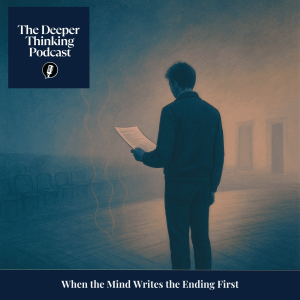
Thursday May 15, 2025
Thursday May 15, 2025
When the Mind Writes the Ending First: Dread, Imagination, and the Ethics of Not Knowing
The Deeper Thinking Podcast
For anyone who’s lived inside the tension of anticipation, and longed for gentler ways to meet the unknown.
Some thoughts don’t arrive with sound. They unfold quietly, posing as realism, slipping past awareness until they’ve shaped the emotional weather of a day. In this episode, we explore how the mind turns ambiguity into catastrophe—not out of dysfunction, but out of memory, vigilance, and the need for control. This is an examination of imagined endings, rehearsed fears, and the strange comfort of believing you already know how things will fall apart.
This is not about optimism. It’s about attending to the stories we silently tell ourselves. Drawing from existential thought, phenomenology, and the gentle precision of cognitive theory, we explore how dread becomes a strategy of survival—and what happens when we stop performing the collapse. With quiet allusions to thinkers like Martin Heidegger, Simone Weil, and Maurice Merleau-Ponty, we ask what it means to remain in the space before the story ends—and to breathe there.
This is an episode for anyone who has lived inside the architecture of imagined harm. For those who have mistaken thought for foresight, vigilance for wisdom, rehearsal for truth. It offers no fix, no instruction—just a quieter atmosphere. A place to hear the spiral and gently choose not to follow it.
Reflections
This episode opens a different kind of door. It doesn’t resolve fear but disarms it, not with answers—but with presence.
Here are some reflections that surfaced along the way:
Catastrophizing isn’t about expecting the worst—it’s about needing certainty where none exists.
Imagined endings are not failures of logic, but gestures of care misdirected by fear.
We often mistake prediction for preparation. But preparation without presence becomes performance.
Some rehearsals are invisible. They shape tone, posture, even breath.
The most dangerous stories are the ones we don’t realise we’re telling.
There is a difference between protecting yourself and abandoning the moment.
Staying doesn’t mean knowing—it means not fleeing before meaning has a chance to form.
Imagination is not the enemy. But it needs to be interrupted when it starts writing tragedies by default.
To leave a story unfinished is not failure. It may be the beginning of something truer.
Why Listen?
Understand catastrophizing as a relational, embodied response—not a mental flaw
Discover how internal narratives shape perception, connection, and breath
Explore how to gently unwrite the ending without losing your place in the story
Engage with Heidegger, Weil, and Merleau-Ponty on dread, ambiguity, and the lived present
Listen On:
YouTube
Spotify
Apple Podcasts
Support This Work
If this episode lingered with you and you’d like to support deeper listening, you can do so quietly here: Buy Me a Coffee. Thank you for being part of this unfolding.
Bibliography
Heidegger, Martin. Being and Time. Trans. Macquarrie and Robinson. Harper & Row, 1962.
Weil, Simone. Gravity and Grace. London: Routledge, 2002.
Merleau-Ponty, Maurice. Phenomenology of Perception. Routledge, 2012.
Bibliography Relevance
Martin Heidegger: Frames anxiety as a confrontation with the nothingness of being—underlying the fear of uncertainty itself.
Simone Weil: Models attention as a moral practice and a quiet resistance to reflexive thought.
Maurice Merleau-Ponty: Illuminates how perception is bodily, not abstract—key to understanding rehearsed fear as lived experience.
The stories we imagine to stay safe can become the ones that keep us from living. Sometimes, the bravest thing is to stop the script mid-line—and stay.
#ExistentialPsychology #Phenomenology #MartinHeidegger #SimoneWeil #MerleauPonty #CognitiveDistortions #NarrativeTherapy #DeeperThinking #PhilosophyOfUncertainty #EmotionalPresence #TheDeeperThinkingPodcast
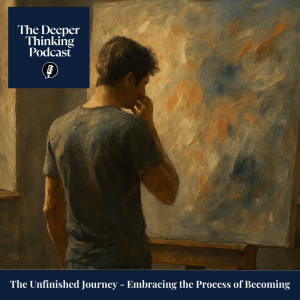
Wednesday May 14, 2025
Wednesday May 14, 2025
The Unfinished Journey: From Chaos to Clarity
The Deeper Thinking Podcast
A quiet exploration of creativity, self-destruction, and the evolution of the artist's relationship with their work.
What does it mean to create not from chaos, but with it? In this episode, we turn toward the artist's journey through excess, self-destruction, and the search for meaning in their creative process. Drawing from existential thought, including the works of Jean-Paul Sartre, Friedrich Nietzsche, and the philosophy of Martin Heidegger, we explore how creation is not an escape from chaos, but a confrontation with it. This episode looks at how the artist moves from destruction toward balance, embracing the fluidity of the creative process and finding freedom in becoming rather than finishing.
This is not about the romanticized "tortured artist" myth. It is an invitation to reconsider the creative journey as a process of self-realization—an exploration of how chaos and clarity coexist within the artist's evolving relationship with their work. With subtle references to Sigmund Freud, Walter Benjamin, and contemporary reflections on creativity, this episode examines how the artist redefines their role—not as the creator of meaning, but as a participant in the unfolding of their own journey and of the world’s ongoing story.
Reflections
Here are some reflections that surfaced along the way:
The true freedom of creation lies not in escaping the self, but in confronting it.
Creation is an act of **becoming**, not of achieving or finishing.
The tension between excess and balance is not a contradiction, but a dialogical process.
Style is never neutral—it is a reflection of how we engage with the world and the self.
The artist’s greatest gift is not resolution, but the invitation to witness the unresolved.
The artist’s journey is not about finality, but about embracing the constant evolution of being.
Why Listen?
Understand the artist’s journey as one of self-realization, not just creation.
Engage with the tension between chaos and balance within the creative process.
Reflect on how the artist’s role is shaped not by perfection but by ongoing evolution.
Explore how creation becomes a dialogue with both self and world.
Listen On:
YouTube
Spotify
Apple Podcasts
Support This Work
If you’d like to support the ongoing work, you can visit buymeacoffee.com/thedeeperthinkingpodcast or provide a positive review on Apple Podcasts. Thank you.
Bibliography
Freud, Sigmund. Beyond the Pleasure Principle. Translated by C. J. M. Hubback. London: The Hogarth Press, 1920.
Benjamin, Walter. The Work of Art in the Age of Mechanical Reproduction. 1936.
Sartre, Jean-Paul. Being and Nothingness. 1943.
Bibliography Relevance
Freud: Understanding the unconscious motivations driving the artist’s creative impulse.
Benjamin: Examining the relationship between art, technology, and authenticity in the modern world.
Sartre: The existential struggle of the artist between authenticity and societal expectations.
Art does not exist to be understood; it exists to become.
#ArtisticJourney #SelfDestruction #Becoming #Creativity #Freedom #Existentialism #Heidegger #Nietzsche #Sartre #Camus #TheDeeperThinkingPodcast #PhilosophyOfArt #ImperfectCreation
This episode is inspired by the tension between creation and destruction, with influences from existential philosophy—particularly as discussed in the works of Sartre, Nietzsche, and Heidegger.
"The journey of an artist is
often seen through the lens of creation,
an act that is as much about the
internal process as it is about engaging
with the external world. Yet, what if
this act is not solely about producing
something to be admired or remembered,
but about an ongoing evolving
relationship between the artist and
their surroundings? Traditionally, art
is viewed as a final product, something
to be completed, perfected, and
ultimately left behind. But what if
creation is not a static achievement,
but an everchanging, continuous act of
becoming? This essay explores the
artist's evolving journey, one that
moves beyond chaos, seeking not to
escape life's complexities, but to
engage with and reflect them in ways
that invite deeper understanding. It
challenges the romanticized notion of
the tortured artist and instead examines
the transformative potential of creation
itself. By navigating the tension
between tween self-expression and
self-doubt, freedom, and limitation, the
artist begins to develop a more profound
understanding of their role. Art becomes
less about an individual voice or legacy
and more about an ongoing shared
experience, one that connects the artist
to the larger human narrative.
This journey of becoming and unfolding
reflects not just the artist's personal
growth but resonates with anyone who
engages with the work. Through this
essay, we will uncover how the artist's
relationship with their work evolves.
How they move from seeking certainty and
control to embracing the uncertainty of
creation and ultimately how they find
freedom in the constant unfolding act of
creation
itself. In the state of excess,
creativity and self-destruction
intertwine, each feeding off the other.
At the height of chaos, art emerges.
Songs born from moments that teeter on
the edge of life and death. These bursts
of creation, though born of turmoil, are
not merely escapes, but attempts to face
the self-destructive spiral. Art becomes
a means to organize the chaos within.
The core paradox lies in awareness. The
destructive force of one's actions is
understood. Yet the need to create in
the midst of that destruction
remains. The interplay between youthful
ambition and self-destruction isn't just
about indulgence, but about the drive to
give form to the internal chaos. In
moments of clarity, this drive converges
into creation. An art that speaks the
unspoken. A song that captures the
ungraspable. But these moments are
fleeting. The myth of escape, believing
that substances or excess can open new
realms of understanding, ultimately
proves false. What was once perceived as
freedom becomes the very force that
constrains. The search for transcendence
becomes entangled in the self-same chaos
it sought to escape. With time and
distance from that life, the creative
process is redefined. No longer a means
of escape, it becomes a way of creating
that is both real and meaningful without
the need for destruction. as a catalyst.
Now contentment derived from simple
existence grounded in life beyond the
chaos provides a new perspective. The
tension between chaos and peace no
longer needs to consume. It can evolve
into a more tempered reflective form of
creation. This journey is not just about
the art made but about the
reconciliation of past and present
selves. The fear of not leaving
something significant behind shifts into
a desire to leave something true. a
reflection of a path through both excess
and redemption. The tension between
creation and self-destruction is not
just a fleeting struggle but a permanent
fixture of the creative process. It is
the paradox of art. The very force that
drives creation also threatens to
undermine it. This conflict is amplified
by the mythology of the artist. The
belief that true art emerges from chaos,
that the greatest creations are born
from suffering and excess. But over
time, the rawness of that belief gives
way to a more tempered understanding.
The art, once a tool for survival,
becomes an expression not of survival
alone, but of deeper reflection. The
danger of excess, once veiled in the
romanticism of artistic freedom, becomes
increasingly apparent. What once felt
like liberation now feels like a
constraint. The very substances that
fueled creativity begin to suffocate it.
What was once a symbol of freedom
becomes a prison, trapping the artist in
a cycle of dependency and destruction.
This recognition shifts the artists
focus from the chaos of creation to the
need for clarity and control. The
journey from chaos to clarity is not
immediate. It unfolds slowly in fits and
starts as the artist confronts the
limits of their own existence. The
tension between creation and
destruction, between freedom and
constraint, shapes the artist's work and
their sense of
self. As the artist moves away from the
mythology of suffering and chaos, they
begin to see that true creation comes
not from excess, but from balance, a
delicate equilibrium between energy and
restraint. Ultimately, this shift in
perspective represents a new phase in
the artist's journey. One embraces the
possibility of redemption. The artist
learns to create not from a place of
destruction, but from a place of
self-awareness and purpose. The desire
to leave something meaningful behind
shifts into a deeper understanding of
what it means to create something true,
something that reflects the artist's
path through both excess and redemption,
not as an escape, but as a
reconciliation of past and present. As
this process unfolds, the artist begins
to understand that true creation is not
bound by the extremes of
self-destruction or indulgence. The
desire for transcendence, once sought
through chaos and excess, evolves into a
pursuit of meaning that transcends the
need for dramatic flare or personal
turmoil. Art no longer serves as a
vehicle to escape from the self, but
becomes a means of engaging with the
self, of understanding the
contradictions and tensions
within. This shift redefes the role of
the artist. No longer defined by the
mythology of the tortured soul, the
artist begins to embrace a more holistic
identity, one that integrates their
experiences of excess with their need
for peace. The tension between these two
states becomes a rich wellspring for
creativity, allowing the artist to
explore new forms of expression that are
both introspective and expansive. The
work becomes less about the need to
leave behind a legacy and more about the
process of creation itself, of engaging
with the world in a way that is both
authentic and meaningful.
There is a subtle recognition that true
artistic expression does not need to be
dramatic or chaotic to have impact.
Instead, it lies in the quiet moments of
clarity, the small gestures of
introspection, and the gentle
acknowledgement of the contradictions
that define the human
experience. In this new understanding,
the artist comes to see that the
creative journey is not about arriving
at a destination, but about embracing
the evolution of thought and expression.
The work may never be finished, but that
is not a failure. Rather, it is a
reflection of the ongoing process of
self-discovery and artistic growth. The
artist moves forward not in search of
perfection, but in pursuit of truth,
both within the work and within
themselves. In embracing this new
perspective, the artist far finds that
their creativity is no longer shackled
to the need for external validation or
the destructive cycles of the past. The
quest for meaning becomes self
sustaining, a force that draws strength
not from external applause or the rush
of indulgence, but from a quiet internal
affirmation. The work itself becomes the
measure of its success, not in how it is
received, but in how authentically it
reflects the artist's own evolution.
This realization brings with it a
profound sense of freedom. No longer
must the artist chase the fleeting highs
of external approval or the rush of
creativity born from turmoil. Instead,
they discover that true freedom lies in
the ability to create from a place of
stability and
self-awareness. The artist, no longer
defined by chaos, learns to wield their
creativity as a tool for exploration,
not escape. As the artist moves further
away from the mythology of
self-destruction, they begin to
understand the deeper purpose of their
work. Art is no longer a means of
proving something to the world, but a
way of understanding and exploring the
world and themselves more deeply. The
work evolves from a personal catharsis
to a shared experience, one that invites
the audience to join in a journey of
reflection and growth. It is not a story
of triumph over chaos, but of a
reconciliation with it, a journey toward
balance rather than conquest. In this
new phase, the artist becomes more
attuned to subtle rhythms of life,
drawing inspiration from the quiet
moments of everyday
existence. Creativity no longer comes
from dramatic streams, but from a
steady, sustained engagement with the
world. This shift allows the artist to
embrace the complexity of the human
experience, understanding that it is not
only in moments of brilliance or despair
that true creation occurs, but in the
ongoing process of being. As the artist
continues to explore this new path,
their creative process becomes more
grounded in the acceptance of
imperfection. The need for a final
resolution once a driving force behind
their work begins to loosen its grip.
The work no longer needs to arrive at a
neat conclusion, but instead can exist
in an ongoing state of transformation.
This fluidity allows for a deeper
connection to the present moment where
the act of creation is as significant as
the end result. The tension that once
existed between the artist's past self
and their present self begins to
dissolve as both are recognized as
integral parts of their identity. The
artist learns to honor their history
with all its chaos and beauty while
embracing the potential for growth and
change. This recognition brings a
profound sense of peace as the artist
sees their journey not as a linear path
of progression but as a series of
interconnected moments that have all
contributed to their current
understanding of themselves and their
art. The work too reflects this shift.
It becomes less about self-expression in
the traditional sense and more about an
exploration of the self within the
context of the world. The artist no
longer feels the need to force meaning
into their creations, but instead allows
meaning to emerge naturally from the
process itself. This openness to
uncertainty creates space for deeper,
more authentic connections between the
artist and their audience as both are
invited to to engage with the work
without the pressure of needing it to be
anything more than what it is. In this
way, the artist's work becomes a mirror,
reflecting not just their own
experiences, but the shared human
condition. It is no longer confined to
personal expression or the need for
validation, but instead offers a space
for reflection, for questioning, and for
discovery. Through this process, the
artist finds that true creation is not
about what they leave behind, but about
the ongoing act of creation itself, one
that is deeply tied to the present and
the ever evolving journey of
self-discovery. As the artist deepens
their understanding of this new creative
process, they come to realize that the
act of creation is a form of dialogue
both with themselves and the world
around them. It is no longer a solitary
pursuit driven by the need for
validation or escape, but a shared
exchange. The artist's work becomes an
invitation not only to the audience, but
also to themselves to explore the
complexities of existence, to confront
contradictions, and to find meaning in
the tension between opposing forces. In
this ongoing dialogue, the artist begins
to see their role not as a creator of
fixed truths, but as a participant in
the unfolding of a larger conversation.
The work is no longer a statement, but a
question, an open-ended exploration that
invites others to engage with it and
find their own meaning. This shift
allows the artist to let go of the need
for certainty and embrace the ambiguity
that exists at the heart of creation.
The work too takes on a new quality. It
is no longer bound by the desire to
communicate a singular fixed message,
but becomes a space for multiple
interpretations and perspectives. The
artist no longer seeks to impose their
vision on others, but instead allows the
work to evolve and resonate with each
viewer or listener in a unique way. This
openness to interpretation creates a
richer, more dynamic relationship
between the artist and the audience, one
that is built on mutual respect and
understanding. In this way, the artist's
journey becomes not just about
self-expression, but about
self-exploration.
The work becomes a tool for personal
growth and understanding as well as a
means of connecting with others. Through
this process, the artist discovers that
true creativity lies not in the pursuit
of perfection or the need to be
understood, but in the willingness to
remain open, to embrace uncertainty, and
to continue evolving. This is the
essence of creation, an ongoing,
everchanging journey that reflects the
complexity and richness of the human
experience. As the artist continues
along this path of openness and
evolution, the nature of their work
becomes increasingly intertwined with
the rhythms of life
itself. Creation is no longer a detached
act or an isolated endeavor, but an
ongoing process that flows with the
everchanging currents of existence. The
artist learns that true creativity comes
not from grasping at fleeting moments of
inspiration, but from fully inhabiting
the present, from embracing the
impermanence of both art and life. The
boundaries between the personal and the
universal begin to blur. What was once
viewed as intensely personal expression
evolves into something that resonates
deeply with others, not because it is
universally understood, but because it
is deeply felt. The artists
vulnerability, their willingness to
expose the messiness of their own
journey invites others to do the same.
In this mutual space of openness, the
work becomes not just a reflection of
the artist's experience, but a mirror in
which others can see their own lives,
their own struggles, and their own
moments of
clarity. This shift in perspective
brings a sense of humility to the
artist. They no longer see themselves as
the sole creator, the originator of
meaning, but as a participant in a
larger tapestry of human
experience. The work in this sense is
never truly finished because it is
always evolving, shifting with each new
interaction, each new interpretation.
The artist's role is not to control or
direct this evolution, but to remain
present within it, to allow their work
to grow and change in response to the
world around it. In this space of
fluidity and evolution, the artist
discovers a new kind of freedom. It is
not the freedom of unchecked chaos or
the promise of escape, but the freedom
that comes with
acceptance. The acceptance that creation
is a living, breathing process that does
not need to be perfected or resolved. It
is in this acceptance that the artist
finds their true voice. Not one that
seeks to impose meaning, but one that
invites others into the conversation.
And in doing so, the artist becomes not
just a creator, but a witness to the
unfolding of their own journey and to
the collective journey of all who engage
with their work. This understanding of
creativity as an evolving participatory
process leads the artist to a profound
realization. The work is not a
reflection of what they've already
known, but a manifestation of what they
are still discovering. It is in the very
act of creating that they uncover new
layers of meaning, new possibilities and
new dimensions of
understanding. Creation then is not a
static representation of self, but an
active engagement with the world, a
constant unfolding that mirrors the
complexity of the human experience. The
artist begins to embrace uncertainty not
as a hindrance but as a source of
strength. It is the uncertainty that
keeps the work alive, that keeps the
journey moving forward. Without the
expectation of clarity or resolution,
the artist is free to explore, to take
risks, and to venture into uncharted
territory. It is this willingness to
remain open to the unknown that infuses
the work with vitality, allowing it to
speak not only to the artist's personal
experience, but to the broader universal
truths that lie beneath the surface of
everyday life. In this space of openness
and exploration, the artist begins to
see that true creation is not about
seeking control, but about surrendering
to the process. The artist does not need
to force meaning or impose structure.
Instead, they allow the work to emerge
organically, trusting that it will
evolve into something meaningful, even
if its ultimate form is not yet clear.
This surrender paradoxically becomes the
source of the artist's greatest power.
The power to create something that is
authentic, raw, and deeply connected to
the pulse of life itself. As the artist
moves through this process, they come to
understand that the ultimate goal of
creation is not to arrive at a
destination, but to engage fully with
the journey itself. The work in its
fluidity and impermanence becomes a
reflection of the artist's ongoing
evolution, a testament to the fact that
creation, like life, is never fully
complete. It is always in motion, always
shifting, always becoming. And it is in
this constant state of becoming that the
artist finds the deepest fulfillment,
not in the achievement of an ideal, but
in the ongoing act of creation itself.
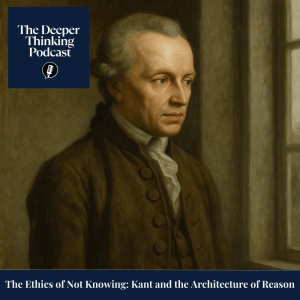
Tuesday May 13, 2025
Tuesday May 13, 2025
The Ethics of Not Knowing: Kant and the Architecture of Reason
The Deeper Thinking Podcast
A philosophical meditation on knowledge, humility, and the dignity that comes from limits.
What happens when reason stops trying to master the world and begins to understand its own limits? In this episode, we explore Immanuel Kant’s Critique of Pure Reason, a work that reshaped Western philosophy by asking what makes knowledge possible in the first place. Touching on transcendental idealism, the noumenon, and the architecture of the synthetic a priori, this episode frames Kant not as a distant logician but as a moral architect—one who builds a space where reason becomes ethical, not just analytical.
This is not a survey or a historical sketch. It is a tonal encounter with Kant’s deepest concern: that to preserve the dignity of reason, we must limit its reach. With gentle echoes of Simone Weil, Hannah Arendt, and the foundations of moral philosophy, this episode offers not a lesson in metaphysics, but an invitation to live thoughtfully within what we cannot know.
Reflections
Here are some reflections that surfaced along the way:
Reason isn’t about grasping everything—it’s about knowing when to stop.
What we cannot prove might still be what we must act upon.
The veil between appearance and reality isn’t a failure. It’s a kind of ethical shelter.
The sublime isn’t always vast. Sometimes it’s just the silence beyond our categories.
To honour reason is not to master the world, but to live justly within it.
Why Listen?
Understand Kant’s Critique through tone, metaphor, and narrative—not just exposition
Explore how limits in knowledge allow for moral and political freedom
Reflect on the ethical implications of not knowing
Reframe reason not as control, but as companionship with mystery
Listen On:
YouTube
Spotify
Apple Podcasts
Support This Work
If you’d like to support the ongoing work, you can visit buymeacoffee.com/thedeeperthinkingpodcast or provide a positive review on Apple Podcasts. Thank you.
Bibliography
Kant, Immanuel. Critique of Pure Reason. Cambridge University Press, 1998.
Weil, Simone. Gravity and Grace. Routledge, 2002.
Arendt, Hannah. The Life of the Mind. Harcourt, 1978.
Bibliography Relevance
Immanuel Kant: Foundational to the idea that knowledge is shaped by the mind’s structure and that ethics begins with epistemic humility
Simone Weil: Offers a vision of attention and restraint that parallels Kant’s moral minimalism
Hannah Arendt: Extends Kant’s moral and aesthetic thought into political responsibility and judgment
To think clearly is not to control, but to accompany—gently, and with care—what cannot be possessed.
#Kant #CritiqueOfPureReason #MoralPhilosophy #TheSublime #SimoneWeil #HannahArendt #EpistemicHumility #TranscendentalIdealism #TheDeeperThinkingPodcast #QuietThinking #PhilosophyOfReason
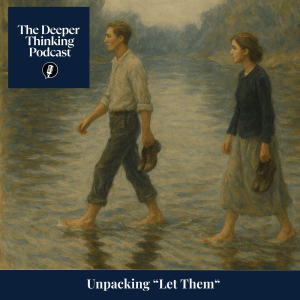
Monday May 12, 2025
Monday May 12, 2025
Unpacking Let Them
The Deeper Thinking Podcast
A quiet tracing of the phrase back through philosophy, ethics, and the emotional architecture of agency and attention.
When Mel Robbins introduced the phrase “Let Them”, it resonated far beyond the world of self-help. In this episode, we follow its deeper structure—through the thought of Viktor Frankl, Iris Murdoch, Epictetus, Judith Butler, and others—to ask what happens when we stop trying to control others, and begin returning to ourselves.
This is not an endorsement or critique. It is a philosophical unfolding of what “Let Them / Let Me” can mean when treated as more than instruction—as a moral and relational ethic. Alongside Carl Rogers, Thich Nhat Hanh, Kierkegaard, and bell hooks, we explore how this simple phrase opens a gateway to something far more enduring: agency without control, presence without pressure, and love without possession.
Reflections
Freedom is not in fixing others—it’s in recognising what was never ours to carry.
Letting someone be is not abandonment. It is the dignity of non-interference.
The moral act is sometimes restraint. Real love leaves room.
“Let me” is the quiet practice of self-return—of choosing not to follow every impulse to manage.
Why Listen?
Reframe Let them as a philosophical ethic of presence
Engage with thinkers like Frankl, Murdoch, Epictetus, and Butler through tone, not jargon
Explore relational freedom beyond detachment or control
Reflect on how restraint, silence, and letting go can become moral choices
Listen On:
YouTube
Spotify
Apple Podcasts
Support This Work
To support future episodes, you can visit buymeacoffee.com/thedeeperthinkingpodcast or leave a kind review on Apple Podcasts. Thank you.
Bibliography
Frankl, Viktor. Man’s Search for Meaning. Beacon Press, 2006.
Murdoch, Iris. The Sovereignty of Good. Routledge, 1970.
hooks, bell. All About Love. William Morrow, 2000.
Butler, Judith. Giving an Account of Oneself. Fordham University Press, 2005.
Rogers, Carl. On Becoming a Person. Mariner Books, 1995.
Bibliography Relevance
Viktor Frankl: Foundation for the space between stimulus and response
Iris Murdoch: Provides ethical framing for attention and non-possession
bell hooks: Resituates love as freedom from domination
Judith Butler: Articulates vulnerability, interrelation, and ethical speech
Carl Rogers: Emphasises presence, self-regard, and relational growth
Let them. Let me. Let this be enough.
#LetThemTheory #MelRobbins #ViktorFrankl #IrisMurdoch #CarlRogers #Butler #bellhooks #Stoicism #RelationalPhilosophy #Unselfing #Presence #TheDeeperThinkingPodcast
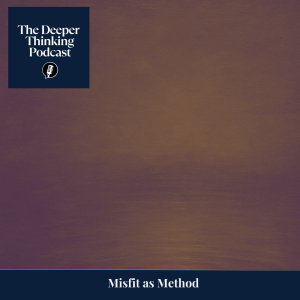
Monday May 12, 2025
Monday May 12, 2025
Misfit as Method: Silence, Legibility, and the Ethics of Hesitation
The Deeper Thinking Podcast
What if the most honest form of communication isn’t fluency, but the pause before it? This episode steps into the quiet architecture of neurodivergent communication—not to diagnose it, but to reveal how it reshapes presence, attention, and relation. We ask what happens when expression is filtered through survival, when silence is both protection and exile, and when clarity becomes a burden rather than a gift.
We explore refusal architecture—a structure of care that emerges through delay, asymmetry, and misfit. This is not about explaining difference. It’s about listening for a form of presence that resists translation. Drawing on thinkers like Emmanuel Levinas, Adriana Cavarero, and Bracha Ettinger, the episode builds an ethics of asymmetric resonance: where voice is not earned through fluency, but through co-presence across friction.
This is a slow philosophy of misfit—not as disorder, but as method. Through recursive reflection, we trace how preemptive self-monitoring, silence-as-shield, and the erosion of conversational trust become architectures in their own right. Instead of fixing the pause, we stay with it. And in that hesitation, something else begins to speak.
Why Listen?
Explore how communication becomes performance under pressure to be legible
Reframe silence as presence, not absence
Learn how neurodivergent modes of speech unsettle normative ethics of fluency
Engage with Levinas, Cavarero, Ettinger, and Wittgenstein on ethics, silence, and voice
Listen On:
YouTube
Spotify
Apple Podcasts
Bibliography
Levinas, Emmanuel. Totality and Infinity. Pittsburgh: Duquesne University Press, 1969.
Cavarero, Adriana. For More Than One Voice. Stanford: Stanford University Press, 2005.
Ettinger, Bracha. The Matrixial Borderspace. Minneapolis: University of Minnesota Press, 2006.
Wittgenstein, Ludwig. Tractatus Logico-Philosophicus. London: Routledge, 2001.
Bibliography Relevance
Levinas: Grounds the ethics of presence before articulation
Cavarero: Reframes identity through voice rather than recognition
Ettinger: Introduces co-emergence and non-invasive relationality
Wittgenstein: Explores the limits of language as the limits of world
To hesitate is not to fail. It is to hold the possibility of being changed by how we hear, and how we are heard.
#Neurodivergence #SilenceAsForm #FluencyAndFriction #VoiceAndCare #AsymmetricResonance #Levinas #Cavarero #Ettinger #Wittgenstein #RefusalArchitecture #TheDeeperThinkingPodcast #EthicsOfPresence
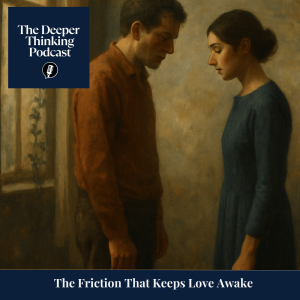
Saturday May 10, 2025
Saturday May 10, 2025
The Friction That Keeps Love Awake
The Deeper Thinking Podcast
We often imagine love as harmony. But what if intimacy lives not in understanding, but in what resists it? In this episode, we explore the ethics of staying—through friction, misrecognition, and the quiet courage of disagreement. A cracked plate. A held breath. A silence that lingers too long. This is a philosophy of argument not as rupture, but as relation.
Drawing from Martin Heidegger, Simone Weil, Emmanuel Levinas, and the psychoanalytic tradition, we reflect on what it means to love someone you cannot fully know. Not to fuse, not to fix—but to remain beside. Even, and especially, when staying trembles.
We move from the myth of compatibility to the dignity of difference. From silence as peace to silence as deferral. Through small domestic moments and the friction that keeps love awake, we ask how conflict, when held with care, becomes a site of return—not abandonment.
This episode is for anyone who has stayed in love not because it was easy, but because it was real. For those who know that disagreement, held gently, may be the last language we have left.
Why Listen?
Reframe conflict as an act of care, not collapse
Explore how thinkers like Levinas, Heidegger, and Weil understand intimacy, alterity, and ethical relation
Understand how silence, rupture, and repair shape enduring relationships (via thinkers like Winnicott and Mitchell)
Learn why staying may matter more than agreeing
Listen On:
YouTube
Spotify
Apple Podcasts
Bibliography
Heidegger, Martin. Being and Time. Translated by John Macquarrie and Edward Robinson. Harper & Row, 1962.
Weil, Simone. Gravity and Grace. Routledge, 1952.
Levinas, Emmanuel. Totality and Infinity. Duquesne University Press, 1969.
Mitchell, Stephen A., and Greenberg, Jay R. Object Relations in Psychoanalytic Theory. Harvard University Press, 1983.
Bibliography Relevance
Martin Heidegger: Grounds the essay in ontological exposure and the condition of “being-with”
Simone Weil: Supports the ethical structure of attention, silence, and the discipline of presence
Emmanuel Levinas: Central to the concept of the other as irreducible and the ethical demand of relational life
Love does not endure by dissolving difference. It endures because two people keep returning—especially when they don’t fully understand each other.
#LoveAndPhilosophy #ConflictAsCare #Levinas #Heidegger #SimoneWeil #RelationshipEthics #AttachmentTheory #Repair #TheDeeperThinkingPodcast #PhilosophyOfIntimacy
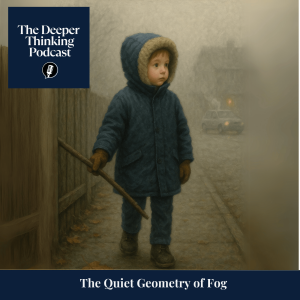
Friday May 09, 2025
Friday May 09, 2025
The Quiet Geometry of Fog
The Deeper Thinking Podcast
W e remember in textures, not facts. In this episode, we explore the architecture of memory through a single childhood autumn morning. A zipped coat. A cracked stick. A fog that holds the world just out of reach. This is a meditation on how rhythm, cold, and unspoken care form the earliest language we know—before words, before meaning, before self-awareness.
We draw on ideas from Maurice Merleau-Ponty, Gaston Bachelard, and Luce Irigaray to explore how space, embodiment, and relational silence shape not just memory—but identity. This is not a nostalgic piece. It’s a quiet philosophy of early form. One where stillness becomes structure. Where absence is not void, but care.
Through frost, breath, and repetition, we follow the small rituals that build the inner world. Not story—but shape. Not sentiment—but structure. A child walks to school through fog, and what emerges is not a narrative, but an ethics of rhythm, restraint, and the dignity of not being watched.
This episode is for anyone interested in how early autonomy forms, how unspoken care works, and how the body remembers what the mind forgets.
Why Listen?
Experience memory not as event, but as architecture
Explore how silence, routine, and cold function as forms of early knowledge
Learn how philosophers like Merleau-Ponty, Bachelard, and Irigaray illuminate the relational and spatial ethics of the everyday
Reflect on how small gestures—placing a stick, zipping a hood—can carry existential weight
Listen On:
YouTube
Spotify
Apple Podcasts
Bibliography
Merleau-Ponty, Maurice. Phenomenology of Perception. Translated by Donald Landes. London: Routledge, 2012.
Bachelard, Gaston. The Poetics of Space. Translated by Maria Jolas. Boston: Beacon Press, 1994.
Irigaray, Luce. Sharing the World. London: Bloomsbury, 2008.
Bibliography Relevance
Maurice Merleau-Ponty: Grounds the essay’s focus on embodiment and the body as site of meaning
Gaston Bachelard: Informs the poetics of childhood space, enclosure, and relational interiority
Luce Irigaray: Supports the spatial logic of care—love expressed through absence, not intervention
Not all memories are events. Some are the shape of a morning. And some still hold us—quietly, without needing to be seen.
#Memory #Phenomenology #MerleauPonty #Bachelard #Irigaray #CareEthics #PhilosophyOfSpace #Childhood #EmbodiedKnowing #TheDeeperThinkingPodcast #QuietPhilosophy #Fog #Stillness #Structure #Ritual









